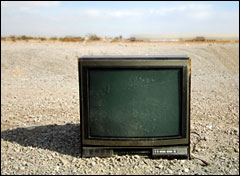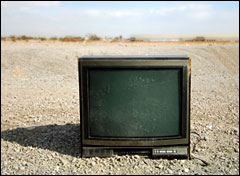Dear Umbra,
I’m awfully concerned about this switch to digital televisions, and it’s not because I’m worried about getting a converter box. I’m anxious at the prospect of millions of old televisions finding their way into the landfills in one mass trashing of old technology. Already at my small apartment complex I’ve seen three big TVs thrown into the dumpster. Isn’t this toxic waste? No one’s talking about anything but converter boxes and rabbit ears. What should people be doing with their old TVs if they decide to opt out of converter boxes and just buy a new one? Isn’t this an ecological nightmare in the making? Can you help allay my fears, or is it as bad as I think?
Analongingly,
Susan
Los Angeles, Calif.
Dearest Susan,
Isn’t watching television supposed to numb you out, so that you don’t worry about this kind of problem? Aren’t we talking about an opiate for the masses?

Yesterday’s news.
Televisions are indeed toxic waste. And while the 110 million U.S. households with televisions have been granted a slight delay in this digital “revolution” thanks to the new administration, the switcheroo should be in full force by June 12, sending millions of televisions to their landfill doom.
When this so-called revolution comes, older televisions with no digital capacity will either need a converter box (get coupon here) or be retired. The change to digital will give emergency and public safety communications more room on the broadcast spectrum, and will apparently give improved picture quality. Can we choose whether we want better or worse picture quality? Better pictures of Jon Stewart I can get behind, but I do not want to see any sharper images of Larry King.
Ecologically this “revolution” is indeed a potential nightmare. A converter box is the economical choice, and online instructions for whether you need one and which kind abound (here’s How Stuff Works). If you do go with the cheaper (and subsidized) converter box instead of the new TV, choose an Energy Star box. If you choose to spend the money on a new TV, it will likely be more efficient than your current model. I will write about this again soon, but in brief, rear projection screens are looking best, then LCDs, then plasma. Read more about it at CNET.
Heedless TV chucking is a problem. Traditional televisions, with the funnel shape and back-straining heft, contain cathode ray tubes. The tubes shoot an electron beam (using, natch, an electron gun) at the phosphor-coated glass. To protect us innocent pleasure-seekers from Dr. Cathode and his evil electron beam, the glass contains lead. Lots of lead — between two and five pounds, near as I can figure. Lead ingestion makes us dumb, so it is very important to recycle CRTs rather than dump them in the trash. They also contain mercury. In many areas, disposing of TVs in the garbage is not only unwise but illegal.
The scope of the problem is vast, as the EPA’s stats attest. In 2007, the recycling rate for televisions was estimated at 18 percent of the 26.9 million units ready for “end-of-life management.” Just for some fun math, at four pounds of lead per TV, 26.9 million TVs equals 107.6 million pounds of lead. That’s a lot of ingots.
The up side is that you can help make it better. A properly retired TV is separated into its component bits — metals, plastic, circuit boards — which are then recycled and sold. The CRT can be made into a new CRT or it can be melted, then the lead separated out and recycled. You can find out where, near you, TVs should go, and spread the word. Find a place to recycle your television at Earth911.com or via the EPA’s eCycling site, which also will tell you the laws in your state. Maybe there is a drop-off site or event near you — there were events in various places around the country in conjunction with the original conversion deadline of February 21. If you felt very motivated, you could create your own drop-off event, find a truck, and take all your neighbors’/co-workers’ TVs to the recycler. At the least you could put up informative signs.
Thank you for reminding us all about the horror that is planned obsolescence and the vital importance that we and all our friends and neighbors dispose of our e-waste with care.
What I really want to know is, can I borrow your most excellent sign-off?
Analongingly,
Umbra



